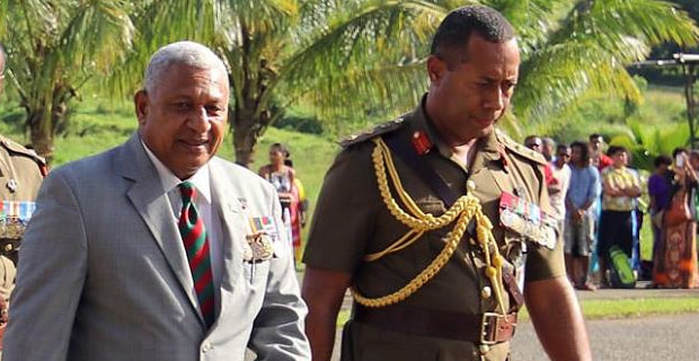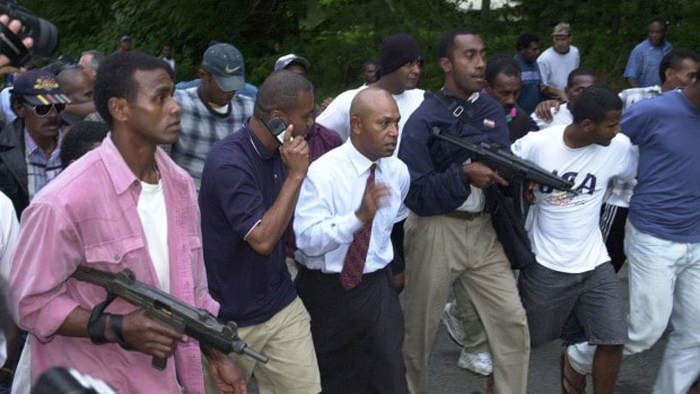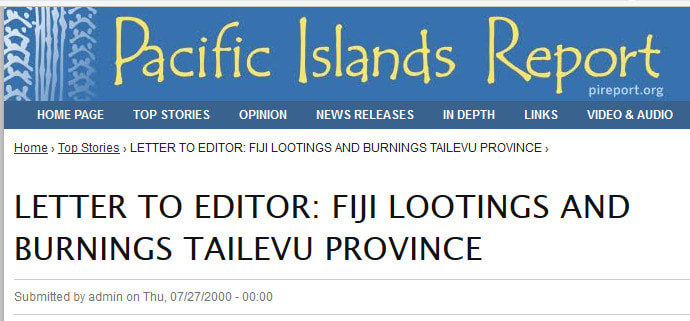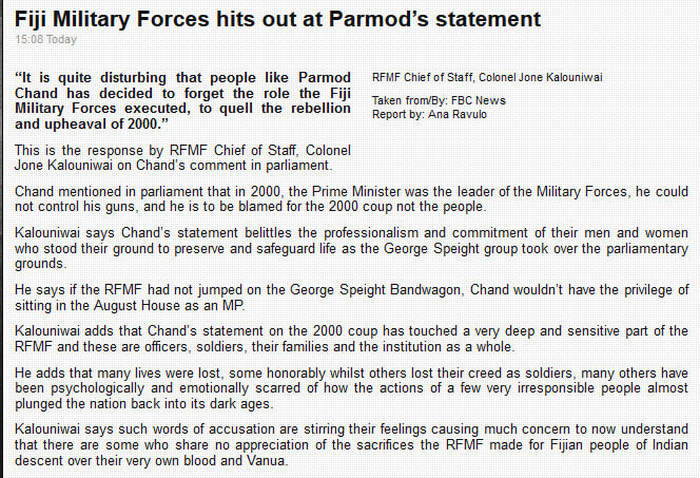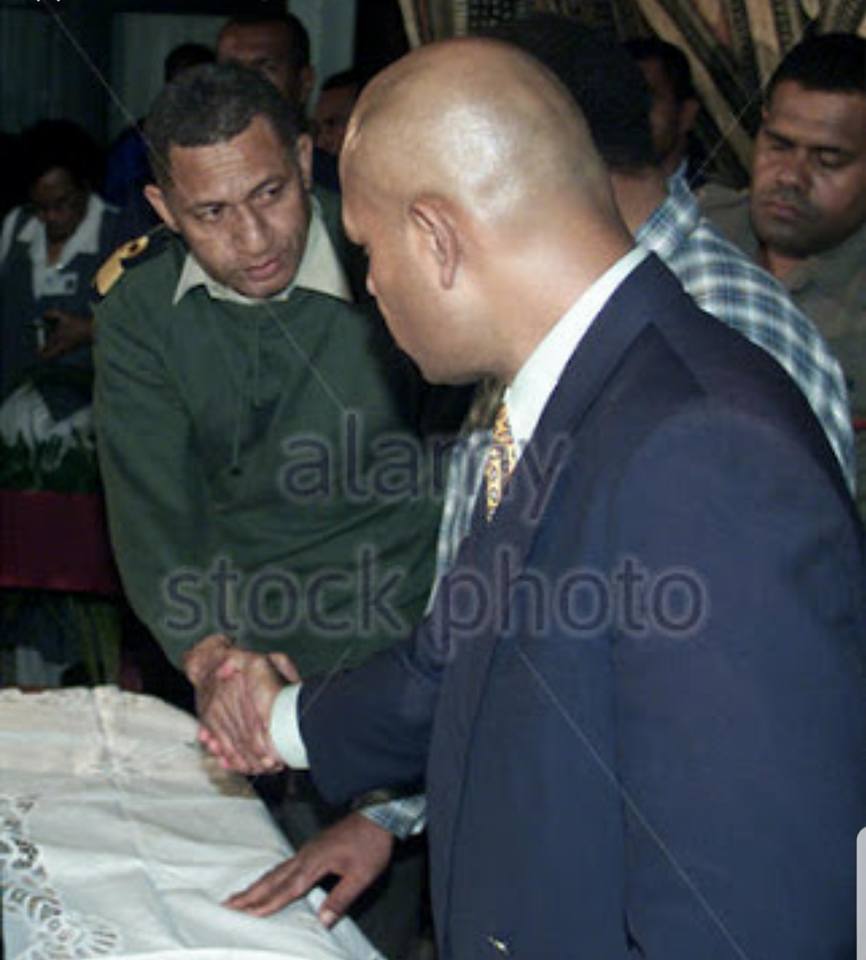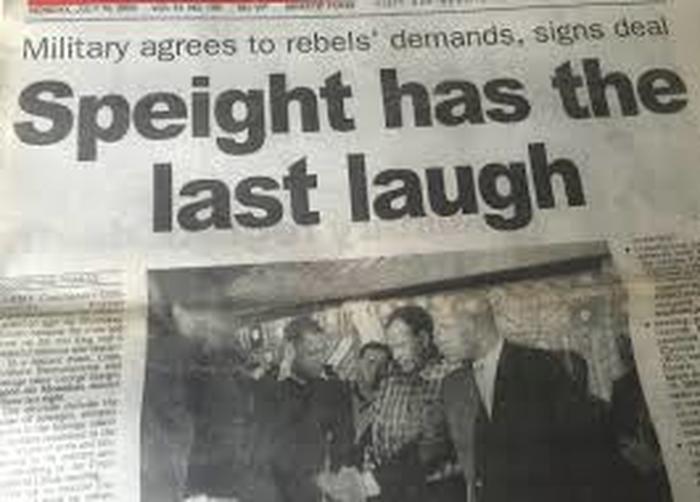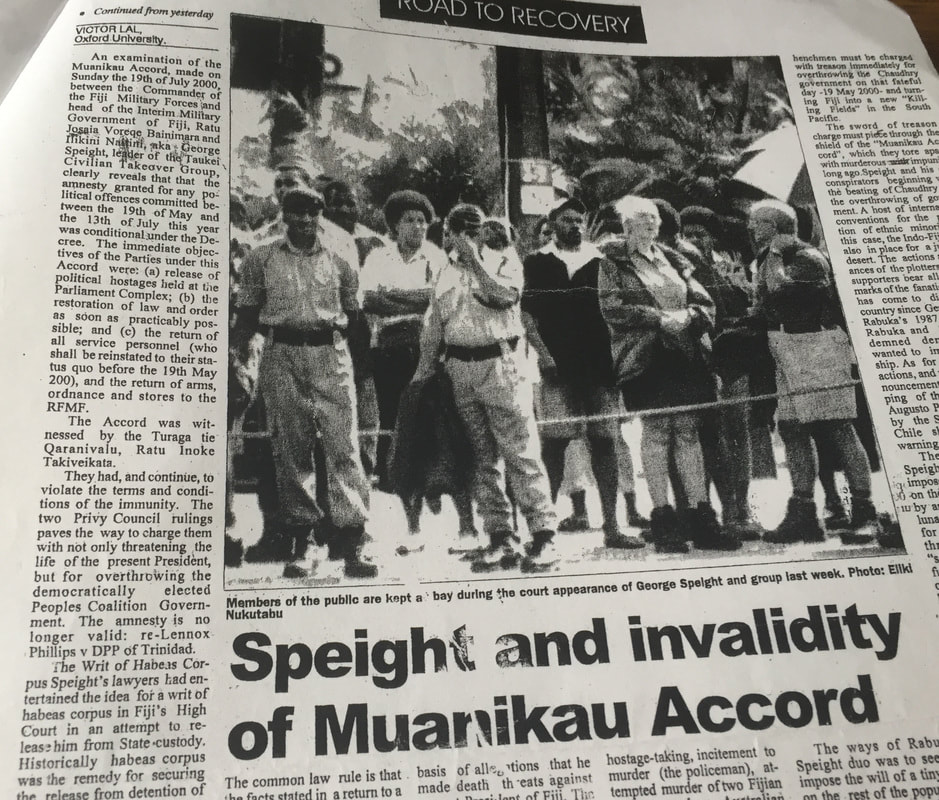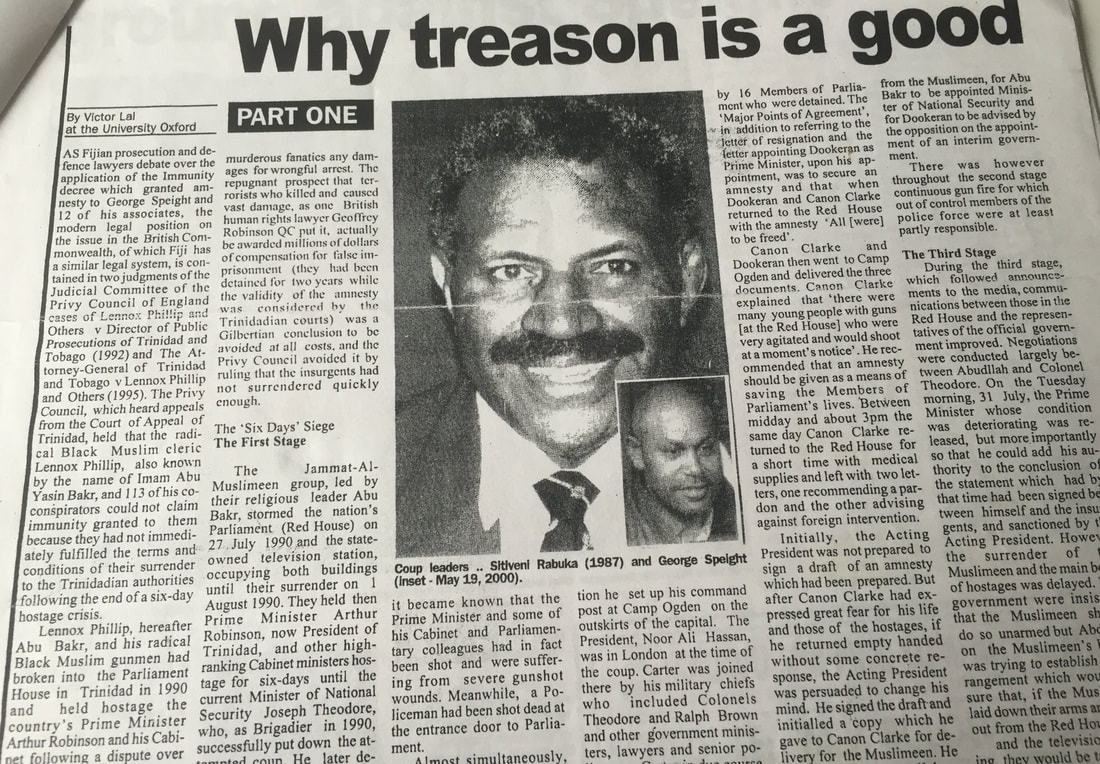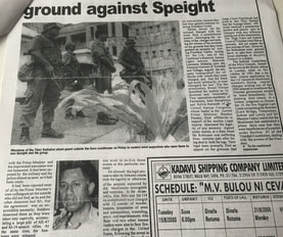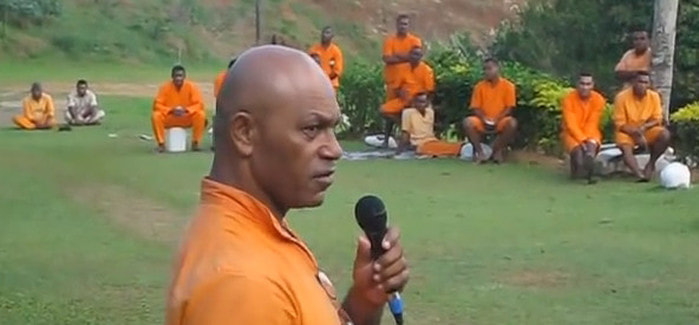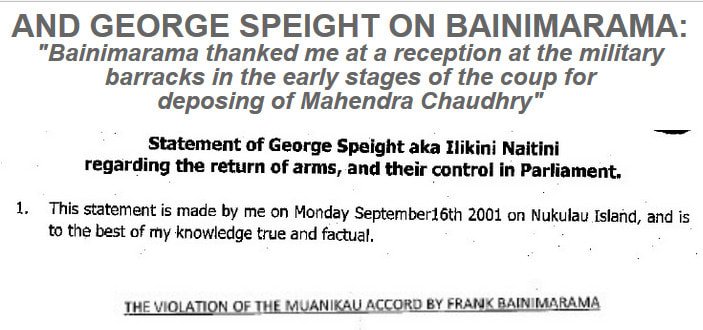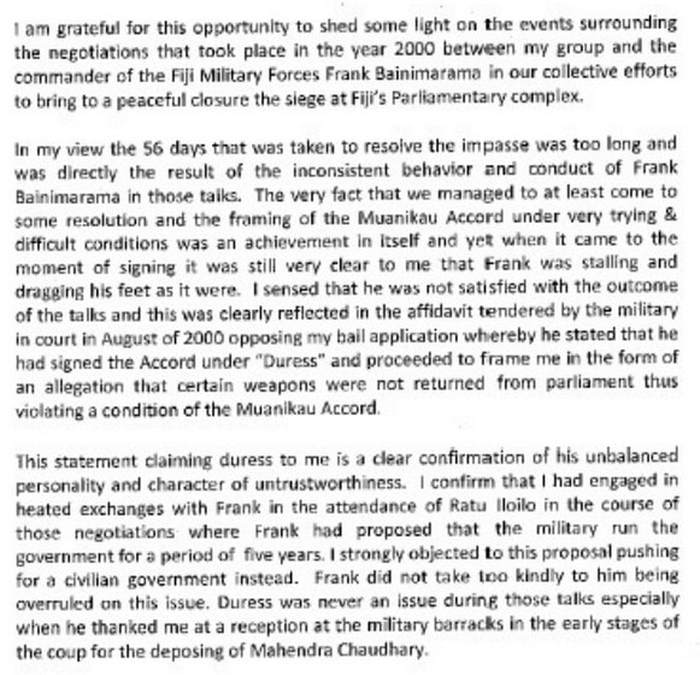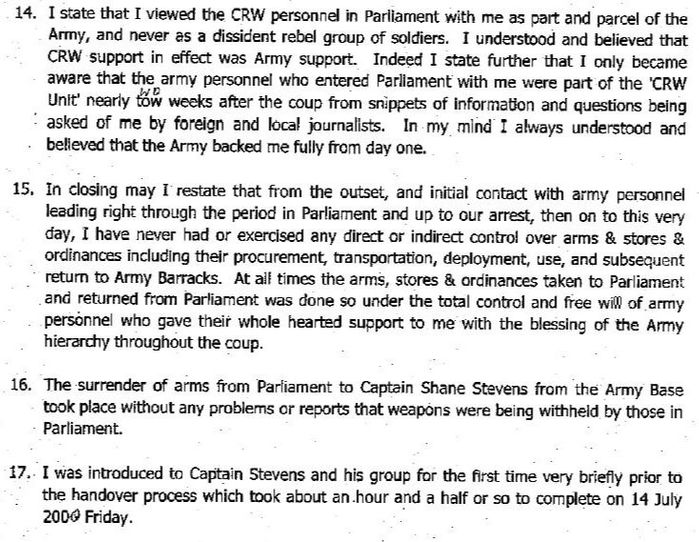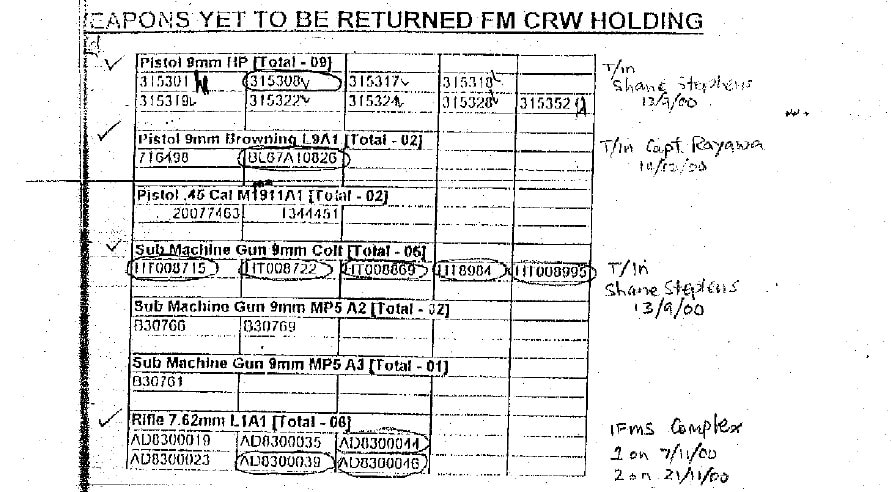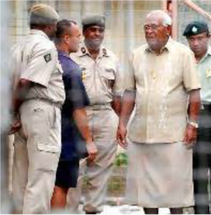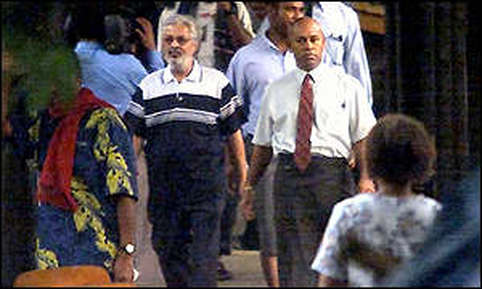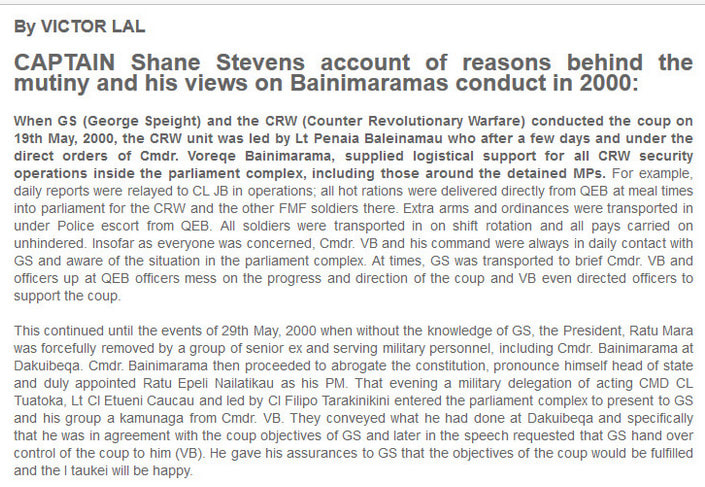Or did your UNIT fail miserably to gain prior knowledge? The Intelligence Operatives who were sent to infiltrate Speight group became part of it
Were you part of the plot to remove Aiyaz Khaiyum as Attorney-General? When will you apologize or explain why your Intelligence Unit failed to stop or warn of the George Speight coup in May 2000?
Who was Speight waiting for to takeover from him?
FRANK BAINIMARAMA: "I had abrogated the 1997 Constitution because I was satisfied that people engaged in the events of May 19 [2000 George Speight coup] were of the perception that the document had watered down the interests of indigenous Fijians. Whether or not those perceptions accorded with reality was not my principal consideration. The perceptions were genuinely held by largely unsophisticated Fijians not equipped to adequately comprehend the niceties and technicalities of the [1997] Constitution.” -
The then RFMF Commander Frank Bainimarama in his affidavit before the
Fiji Court of Appeal, February 2001
We would like to remind Ratu Jone Kalouniwai that his Intelligence Unit's abject failure to warn the Chaudhry government of the planned 2000 coup led to the terrible infliction of violence on the Indo-Fijians as chronicled by Father John McEvoy and his team, July 2000:
Submitted by admin on Thu, 07/27/2000 - 00:00LETTER TO THE EDITOR
Wednesday, July 26, 2000
FIJI LOOTINGS AND BURNINGS TAILEVU PROVINCE
To Whom It May Concern:
The Looting and Burnings in Dawasamu, Waidalice, Namoli and Delasui areas of Tailevu Province - From July 8 to July 20, 2000
The following is an attempt to document some of the atrocities committed against Indian cattle, pig and vegetable farmers in the Namoli, Waidalice, Delasui and Dawasamu areas of Tailevu Province after the take-over of Korovou Town, Tailevu, on Saturday, July 8, 2000, by Speight’s supporters in the area. During the 12 days that followed this takeover, orchestrated crimes were inflicted on a terrified and helpless population living on their isolated farms.
Having documented some cases of looting and break-ins at Muaniweni, Naitasiri, after the May 19 Coup, various groups, religious and others, encouraged me to do similar reports on the Tailevu happenings. We undertook this on Monday, June 24. Earlier attempts of visits were advised against and deemed imprudent. Even on Monday, people in Korovou were not sure if it were safe for us to go to Dawasamu. However, having come thus far the team decided to persevere and travel on.
The team for the day was Radha Krishnan, Eli Daulato, a well-known teacher from the area, Sr. Xavier SOLN and myself.
Dawasamu is reached by traveling northeast form Suva on the Kings Road to Korovou (40 km) on to Natovi on the Lodoni Road (20 km) and on the Dawasamu Road for yet another 15 kilometers.
Anand Singh: We first stopped at the pig and cattle farm of Anand Singh from the Waidalice area about 6 km from the town of Korovou and into the left about 2 km from the main road. Anand, his wife Ishra Devi, daughter Mala - a Form 6 student at Fulton College and a son live here on a very well-run pig and cattle farm of about 213 acres lease land - the lease has expired about a year ago. The family has farmed here for the past 25 years. At the present time they are trying to sell the farm and the stock.
During that week of the Korovou takeover (July 8 - July 20) the Indian families along the main road came to shelter in his house and later on, as reports of looting and stealing got worse and when the rebels but up a road block at the Waidalice bridge on the main road leading towards Korovou, these people moved further into the hills and lived with Fijian families. Anand’s wife and daughter moved to Suva. He hid his vehicles further back from his house as reports came in of farmers who had their twin cabs and other vehicles stolen.
Due to good leadership and the erecting of a roadblock on the road leading to his farm with the help of his Fijian neighbors (all of whom are originally from Motoriki in Ovalau) he protected his two vehicles and perhaps his house. When the rebels took over the place they wanted vehicles for transport and pigs and cattle to feed their gang.
The rebels eventually approached Anand and told him if he gave a pig they would not burn his house. It was his turn to give a pig since a neighboring farmer had given a cow. Anand gave them a pig while another neighbor gave them 2 cows. Isolation was the enemy and because the farms were far apart it was impossible to protect one another. Of course the rebels holding the town of Korovou were also holding both police and soldiers hostage in the police station all during this time. They had taken the soldiers weapons and were patrolling their checkpoints and town with these.
Namoli Settlement: In nearby Namoli settlement 5/6 dairy farmers were attacked and their homes were looted and robbed. One case it was particularly bad -- an elderly couple was attacked from 9:00 pm in the night until 1:00 am in the morning. The woman suffered broken ribs and was badly bruised all over. (I met this couple receiving counseling at the Women’s Crisis Centre in Suva on Friday July 21). Another man whose house was attacked in Namoli has died since.
Although the community here has a burial ground the other side of Korovou town, his family took his body, for safety reasons, to be buried in Suva. We met the funeral procession as we traveled to Korovou on that Monday morning.
Jaswant Singh – Veilolo: Jaswant Singh, his wife, 4 children, mother and his sister Kamlesh, schoolteacher at Natovi Catholic School - living in Veilolo, 5 km further on from Natovi jetty on the Dawasamu Road. Their farm is yet another well run pineapple and vegetable farm. About 40 youths from Lawaki village protected this house from being burned and looted for the 2 weeks duration of the troubles in the area. Indian houses around were either looted or burned. The rebels came and demanded the keys of their truck that the family used to take pineapples to market. However, when they saw the number of the Fijian youth they departed.
In Lawaki Settlement 8/7/2000, Kamlesh Singh reports: The day of the roadblock the whole settlement was gathered together for a wedding. We heard of several looting cases in parts of Tailevu. We also heard that vehicles were being seized. About 2:00 pm, two truckloads of people (mostly outsiders to us) stopped at one of the homes. Inside one of the trucks two policemen were tied and some soldiers also. Some men got off put a knife to an Indian farmer’s throat and demanded the keys to his vehicle. He was threatened that his home would be burned down. They took his pick-up van. After half an hour they did the same at another home and took another pick-up van.
Other farmers once alerted of what was happening hid their vehicles out of sight from the main road. The nearby villagers came in great numbers and stayed with families. Those from Lawaki village stayed in my home and are still here at the present time. Those from Burelevu village stayed with other families. All the women slept in the home where the wedding was supposed to take place for one and a half weeks.
Only one home in Lawaki was looted. It seemed they were just about to set it on fire when the boys looking after our property discovered it and chased them away. This house was broken up, doors and windows were smashed, furniture was wrecked and groceries scattered all over the floor.
On Sunday night 9/7/2000, 3 men came home and asked for our vehicle. The Fijian men who stayed home overnight handled them. They went away, probably scared when they saw the number of men in our house.
The two vehicles that were seized were returned. The boys from Namena village went and demanded the return of the vehicles from Rakiraki. (The Chief of Namena is the Ratu (Chief) of the Tikina (Rakiraki).
In the Nasoni Area: From Veilolo to Dawasamu it is reckoned that some 20 Indian houses in all were looted, ransacked and badly damaged and one completely burnt down.
Houses Burnt
Vinesh Prasad, his wife and their two children (1 and 3 years old), his parents Rajend Prasad and Kesar Mati, his cousin Ritesh, lived here in a nice four bedroom house in Veicorocoro, some 3 km from Veilolo.
The Facts
At about 8.00 pm on Sunday night July 9, 2000 a group of Fijian youth numbering about 20 in all arrived in their church cloths. Some 7 of them entered the house while the remainder stayed outside. They intimidated the family, punched some of the family in the side and held a knife to the neck of Ritesh (cousin). They robbed and ransacked the entire house and took everything they could, money, jewelry, TV and deck electric tools and carpentry tools. Vinesh says that he thinks that this group was from the village of Qelekuro.
Because of this robbery most of the family moved elsewhere. The parents went to Ba. His wife and two children went to Rakiraki. Vinesh himself moved in with a neighboring Fijian family on the opposite side of the road.
On the following Sunday night 16 July, at about 1:00 am, Vinesh and the Fijian family were awakened with the sound of a huge explosion as the house went up in flames and within minutes the entire 4 bedroom house, estimated cost $50,000.00, was gutted and soon lay in a heap of ashes. Even the nearby lemon and mango trees were burned.
When we visited this area at about 3.00 pm on Monday, Vinesh, in his mid-twenties, was working in the nearby field. When he saw us approaching his burnout family house, he came to chat with us and to tell us his story. It was a most emotional meeting between himself and Eli Daulato. She was his teacher at Natovi Catholic School some years ago. They were both wanting for words. As for Vinesh, he said that he was glad that his family was safe.
Bhagat Ram: No. in family 5. This was the first house in Dawasamu to be burnt. This was a very large concrete house with tiled floor. This family has now moved to Suva.
Kenal Dhasi Singh: No. in family 3. House burned. This family has moved to his brother’s house, living in another part of Dawasamu.
Shiu Ram’s very large 6-bedroom house and garage was burned on Thursday night July 13, at about 10:00 pm. His car and three generators were also burned in the inferno. This burning followed the usual pattern used for burning houses in the area. Bottles of petrol was set alight and lobbed through the window, which on impact would explode and quickly cause the fire to spread quickly. A week before this they attacked the house with stones. They poured petrol over two cows and burned them -- they died. They also injured two other cattles by cutting their legs with a cane knife. They then smashed the window screen glass of their two trucks.
One Fijian and five Indian men work for Shiu on his vegetable farm. Since the initial attack they are living with Fijian families. Kamal Prasad, his wife and their daughter Rajnita Wati - a Form 6 student at Queen Victoria School were living in the house the night it was burned. They fled to the nearby village. Rajnita lost everything she needs for school in the fire, cloths, books, uniforms and bags etc. Shiu Ram was in Suva at the time. He is still there but he has returned to have a look a few times. He is shocked at the sight. His wife was in Australia for a daughter’s wedding even before the Coup May 19 took place.
Jadish Prasad - Naivinitavi Settlement: His father and Shiu Ram are bothers. When the thugs arrived at his house they entered and gathered up cloths and set fire to them inside as a threat. Then they demanded $500.00 but Jadish had only $250.00. He gave them this and they departed.
The above is just an effort to highlight a few cases in this area and to show the extent of damage that can be done in a short time to individuals and families by thugs and lawless men. We meet only a few people affected and in pain as a result of the present political situation. We have done this for the benefit of any group or organization -- church or political, national or international -- that may want to know or want to help out in some way.
Thank You.
(Fr) John McEvoy Columban Fathers P.O. Box 2364 Government Buildings Suva, FIJI Tel: 679-308 290 Fax: 679-308 292 Email: [email protected] Mobile: 953800 Nasese, Suva, FIJI ISLANDS
From The Fiji Sun, 17 September 2017:
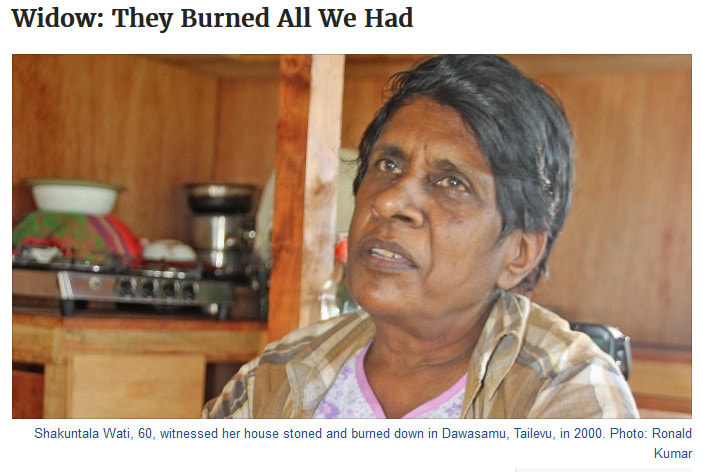
Ms Wati, 60, said a group of fearsome men, supporters of George Speight’s coup, first stoned the house before they fire-bombed it at Dawasamu, Tailevu.
She, her husband and seven-year-old son fled with just the clothes they were wearing. The next minute their carrier and tractor were engulfed in flames.
Her account of that tragic event is one of the untold stories of the horrors of the coup that deposed Mahendra Chaudhry, the first Indo-Fijian prime minister. The coup was carried out to seek iTaukei political supremacy. She decided to tell her story to back the Prime Minister Voreqe Bainimarama and Colonel Ratu Jone Kalouniwai about the role of the military in restoring order. Mr Bainimarama and Colonel Ratu Jone have criticised National Federation Party MP Parmod Chand in Parliament for blaming Mr Bainimarama and the military for the coup. The coup unleashed a spate of violence in parts of the country including Dawasamu, by supporters.
Ms Wati, who now lives in Calia, Navua, said she stood under a tree with her son, while her house burned to ashes.
It was around 7.30pm on Wednesday evening on July 12, 2000, when Ms Wati was having dinner with her husband, the late Kewal Singh who was 61 then, and son Shelvin Chand when three iTaukei men walked into their home and demanded yaqona and money.
“My husband said to the men that we do not have the yaqona and any money on hand. They said to us to give them the money and they will be protected. But we did not have anything to give except for the food I had cooked that evening.
“After they were done with the dinner, they went out and a few minutes later, stones were thrown at our house. My husband ran outside to see what happened but by then a group of men came and threw something that caught fire in our house.
“I quickly grabbed my son and held onto him tight to save him and ran outside the house. I still do not remember if I ran downstairs or I jumped. I just had in my mind to save our lives.
“As I stood under the tree with my son next to me, I watched our house, tractor and carrier which were our source of income burn to ashes.
“When we went to the Police post, we saw a group of men drinking yaqona and Police officers standing there but they could not help us.
“Two days before our house burned, my husband’s brother’s house was also burned. After the incident at our house, the place we got shelter at was burned two weeks later.
“We were left with nothing, not even a single coin to spend. We only had what we were wearing.
“When we moved from Dawasamu, I have been too scared to go back even for a visit to see the place where we used to stay,” Ms Wati said.
She said after the incident, her husband had run around places to get help but nothing was done for them.
“I do not know where he went, but he had gone to get help for us, especially our son, but we never got any responses back from anyone,” she said.
“After we moved to Navua, we heard the Republic of Fiji Military officers had gone to Dawasamu to control the situation there as it was getting worse day by day.
“Till this day, it has been 17 years but the incident haunts me. I still have that as a memory of how our lives took a huge turn around and left us with nothing.
“Since then, I have had very high blood pressure but the memory never goes away. It never will.”
In other words, their acts could only be justifiable on the basis of the Doctrine of State Necessity, a difficult and not too well known branch of the law.
The Doctrine of State Necessity is based on the application of three well-known maxims, namely,
(1) that which is otherwise unlawful, necessity makes lawful;
(2) that the safety of the people is the supreme law:
(3) and the safety of the State is the supreme law.
These maxims, which have been generally relied on to justify the acquisition of private property by the executive for the defence of the State in times of war, have also been accepted as being applicable to other instances of national emergency which threaten the security of the State.
Applying the conditions set out in the above passages on the Doctrine of State Necessity to the acts of Ratu Mara and the Interim Military rulers it will be seen that none of them have satisfied the conditions laid down, and are clearly in breach of the doctrine.
The inclusion of George Speight, his supporters, and the gunmen, in any new interim administration, would also be unsustainable on the basis of the Doctrine of State Necessity and therefore illegal and unconstitutional.
The most useful guidelines set out as a prerequisite for the operation of interim administration or martial law administration, when the law of necessity is pleaded as justification for the usurper's actions, can be found in the following words of the British constitutional lawyer Leslie Wolf-Phillips.
Analysing the military takeover of Pakistan by General Zia -ul-Haag in 1977, Wolf-Phillips wrote:
'The law of necessity is a law for caretakers not for landlords. In the case of present-day Pakistan it is the future elected representatives of the people who are the landlords and it is the duty of the caretakers to take care; to continue the metaphor within the judgment of the Supreme Court, the care takers should promote the good of the people, ensure good order in the neighbourhood of the property, keep to the condition of the deeds as to the use of the property, bring the property to a habitable condition as soon as possible, and hand it over to those who own it. The caretakers are not entitled to make radical changes in the structure, introduce restrictive covenants, keep the landlords waiting because the caretakers are not satisfied with the furniture and the decor, and impose conditions on the landlords for return to use of their own property'.
In a similar vein is the following oft-quoted passage from Raymond Odent's Contentiedux Administraif (1961) which was alluded to by Wolf-Phillip's study entitled 'Constitutional Legitimacy:
A Study of the Doctrine of Necessity', published in Third World Quarterly journal in October 1979:
'First, it is necessary that the circumstances in terms of time and place, have an undeniable and patently exceptional character: secondly, it is necessary that the authority which has normal competence in the matter has not got the physical or juridical possibility to intervene and, consequently, to take proper steps to avert the circumstances. The third condition refers to the end to be achieved; this end must be of such importance that if it were not achieved, one of the fundamental tasks of the public powers could not be accomplished - Besides, decisions taken within the frame of the theory of exceptional powers in an emergency must be of such a nature as to satisfy two conditions: first, these decisions must be very precisely proportionate to the aim to be achieved, and secondly, in the case of decisions concerning regulations, they must be limited in time for the duration of the exceptional circumstances.'
As it turns out, the democratically elected government of Mahendra Chaudhry has been dismissed, the 1997 Constitution abolished, and there are talks of possible immunities for the hostage-takers, including George Speight, the principal 'revolutionary' in the crisis.
If the interim government, and its 'revolutionary elements' introduce an entirely new racist Constitution, all the legislative and administrative measures taken by them, may be open to legal challenge by Mahendra Chaudhry and his government on basis that there was no civil or State necessity.
In the famous Asma Jilani case in Pakistan (1972), Hamoodur Rahman, Chief Justice, in considering President Ayub Khan's action in handing over the presidency of Pakistan to the Armed Forces, asserted that General Ayub Khan had no such power and that, accordingly, the assumption of office by Agha Mohammed Yahya Khan as Chief Martial Law Administrator and later as President was unconstitutional: being an act of usurpation.
In that case, the Court also considered the application of the doctrine of the international lawyer Hans Kelsen, viz, that 'any abrupt political change not within the contemplation of the Constitution constitutes a revolution, no matter how temporary or transitory the change, if no one has taken any steps to oppose it'.
The learned Chief Justice expressed his entire disapproval with this doctrine in the following words:
'With the utmost respect, therefore, I would agree with the criticism that the learned Chief Justice (Muhammed Munir) not only misapplied the doctrine of Hans Kelsen, but also fell into error that it was a generally accepted doctrine of modern jurisprudence? The principle enunciated by him is wholly unsustainable and I am duty bound to say that it cannot be treated as good law either on the principle of stare decisis or even otherwise.'
The Chief Justice then came to a conclusion which would perhaps be the way to solve Fiji's problems in due course: 'I too am of the opinion that recourse has to be taken to the Doctrine of Necessity where the ignoring of it would result in disastrous consequences to the body politic and upset the social order itself but I respectfully beg to disagree with the view that it is a doctrine for validating the illegal acts of usurpers? I would call this a principle of condonation and not legitimisation.'
The Doctrine of Necessity, it seems, however, cannot be satisfied in the current Fijian crisis because the actions of Speight, his advisors, and his gunmen are purely of a criminal nature (treason), and who should be prosecuted for treason, hostage-taking, kidnapping, blackmail, and incitement to violence and murder (the innocent policeman).
Moreover, the Fijian State as a whole had never been on the brink of civil war or facing widespread violence and revolution. It was only the capital Suva that had been plunged into chaos by a bunch of hoodlums following the illegal seizure of Parliament. What the Fijian military and the President ought to have done in this instance was to declare 'Parliament' a no-go zone' and treated the whole crisis as a hostage situation. It thus follows that the invocation of Doctrine of Necessity was never an issue in the whole sordid affair.
In other words, at no time was the Fijian State on a brink of total collapse.
In 1987, the late Ratu Sir Penaia Ganilau, said he had dismissed the Bavadra government because he was unable to restore Parliament and that it was his responsibility to take into account the 'practical realities of the situation and the social structure of Fiji'. He also proposed to exercise the prerogative of mercy in favour of Sitiveni Rabuka and others 'implicated in the illegal seizure of power' because 'no useful purpose would be served by vindictiveness which might hinder the complete restoration of legitimacy'.
Dr Bavadra and his ministers were released although he declared those involved in the coup were guilty of treason. They also challenged the legality of the dissolution of Parliament 'in that it was not done on the advice of the Prime Minister as required by the Constitution'.
In this particular instance, it seems that the military rulers are treading a similar path by planning to pardon Speight and his gunmen. The whole act, besides being illegal, is also setting a dangerous precedent for the seizure and overthrow of future Fijian governments by any disgruntled 'Tom, Dick and Mary'.
The actions of the late President Ganilau, then governor-general, insofar as the Constitution was concerned in dissolving Parliament, is widely acknowledged by legal experts, to have been illegal, and a similar judgment could be reserved for the actions of President Ratu Mara in the current crisis.
The contrived situation created by the President appointing a minister to be acting PM on condition that he advises dismissal of the whole cabinet. The outcome did not address the hostage crisis at hand and could not be said to have been necessary for that purpose.
The President is supposed to have ceded or assigned executive authority to the Army and has himself stepped aside or stepped down. I don't' think he can step aside and allow the Army Commander to take over his authority. And if he does, then the Vice President should take over. Any such move is also unrelated to dealing with the hostage crisis.
Having obtained 'executive authority' and therefore purporting to act lawfully under ostensibly delegated power to focus on the hostage issue, any attempt to abrogate the constitution would seem to be also beyond the pale of the necessity doctrine.
The imposition of martial law, the abrogation of the multi-racial 1997 Fiji Constitution and the possible pardoning of Speight and his henchmen for their actions, which has thrown the capital Suva into turmoil, does not fit squarely with the Doctrine of State Necessity.
The essence of the doctrine is that if an action that is illegal was taken to safeguard the security of the state or the welfare of its citizens when no lawful course was possible, the necessity of the case excuses the illegality.
The Doctrine of Necessity requires that the old constitutional order be respected as far as possible, with the only minimum deviations from it necessary for the exigencies of the situation being permitted.
It now seems that the new administration appears to have committed itself to the aim of Speight and his gunmen - the establishment of Fijian supremacy - which in principle violates all international legal conventions.
Similarly, there would appear to be little social or legal justification for the general amnesty of Speight and his collaborators. It is now quite clear that Rabuka's amnesty of 1987 may well have encouraged Speight, the militant Taukei movement, and their collaborators to wreak havoc and lawlessness in the name of Fijian nationalism.
In Rabuka's case, the exercise of the 'prerogative of mercy' was only possible after a conviction but Ratu Penaia's explanation was that no purpose would be served by vindictiveness, which might hinder the complete restoration of legitimacy.
It seems that Speight is being allowed to follow in Rabuka's footsteps, instead of being marched into a court of law to determine the legitimacy of his actions in the dismissal of a democratically elected Chaudhry government, the 'suspension of Ratu Mara's presidency, the abrogation of the multi-racial 1997 Constitution of Fiji, and the violence and thuggery of his hoodlums.
The only necessity, it seems, was for the military and the police, to solve an ugly hostage crisis, which had donned the mantle of Fijian nationalism in the heart of the capital and the seat of power in Fiji.
The military and the Fijian establishment, it is obvious, did not contemplate the second test of the Doctrine of Necessity: there must be no other course of action reasonably available.
Instead, they are going along with the demands of a gunman - Speight - in the guise of the Doctrine of State Necessity, to implement 'apartheid in paradise' in Fiji.
